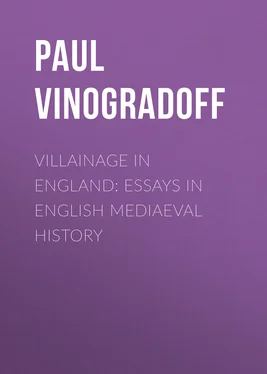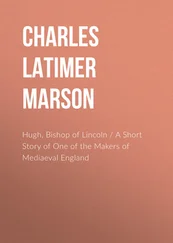Paul Vinogradoff - Villainage in England - Essays in English Mediaeval History
Здесь есть возможность читать онлайн «Paul Vinogradoff - Villainage in England - Essays in English Mediaeval History» — ознакомительный отрывок электронной книги совершенно бесплатно, а после прочтения отрывка купить полную версию. В некоторых случаях можно слушать аудио, скачать через торрент в формате fb2 и присутствует краткое содержание. Жанр: foreign_prose, Юриспруденция, История, foreign_edu, foreign_antique, на английском языке. Описание произведения, (предисловие) а так же отзывы посетителей доступны на портале библиотеки ЛибКат.
- Название:Villainage in England: Essays in English Mediaeval History
- Автор:
- Жанр:
- Год:неизвестен
- ISBN:нет данных
- Рейтинг книги:4 / 5. Голосов: 1
-
Избранное:Добавить в избранное
- Отзывы:
-
Ваша оценка:
- 80
- 1
- 2
- 3
- 4
- 5
Villainage in England: Essays in English Mediaeval History: краткое содержание, описание и аннотация
Предлагаем к чтению аннотацию, описание, краткое содержание или предисловие (зависит от того, что написал сам автор книги «Villainage in England: Essays in English Mediaeval History»). Если вы не нашли необходимую информацию о книге — напишите в комментариях, мы постараемся отыскать её.
Villainage in England: Essays in English Mediaeval History — читать онлайн ознакомительный отрывок
Ниже представлен текст книги, разбитый по страницам. Система сохранения места последней прочитанной страницы, позволяет с удобством читать онлайн бесплатно книгу «Villainage in England: Essays in English Mediaeval History», без необходимости каждый раз заново искать на чём Вы остановились. Поставьте закладку, и сможете в любой момент перейти на страницу, на которой закончили чтение.
Интервал:
Закладка:
Identification with Roman slavery.
It is not strange that in view of such disabilities Bracton thought himself entitled to assume equality of condition between the English villain and the Roman slave, and to use the terms servus , villanus , and nativus indiscriminately. The characteristics of slavery are copied by him from Azo's commentary on the Institutes, as material for a description of the English bondmen, and he distinguishes them carefully even from the Roman adscripticii or coloni of base condition. The villains are protected in some measure against their lord in criminal law; they cannot be slain or maimed at pleasure; but such protection is also afforded to slaves in the later law of the Empire, and in fact it is based in Bracton on the text of the Institutes given by Azo, which in its turn is simply a summary of enactments made by Hadrian and Antonine. The minor law books of the thirteenth century follow Bracton in this identification of villainage with slavery. Although this identification could not but exercise a decisive influence on the theory of the subject, it must be borne in mind that it did not originate in a wanton attempt to bring together in the books dissimilar facts from dissimilar ages. On the contrary, it came into the books because practice had paved the way for it. Bracton was enabled to state it because he did not see much difference between the definitions of Azo and the principles of Common Law, as they had been established by his masters Martin of Pateshull and William Raleigh. He was wrong, as will be shown by-and-by, but certainly he had facts to lean upon, and his theory cannot be dismissed on the ground of his having simply copied it from a foreigner's treatise.
Villains in gross and villains regardant.
Most modern writers on the subject have laid stress upon a difference between villains regardant and villains in gross , said to be found in the law books 41 41 Stubbs, Constitutional History, ii. 652, 654; Freeman, Norman Conquest, v. 477; Digby, Introduction to the Law of Real Property, 244.
. It has been taken to denote two degrees of servitude—the predial dependence of a colonus and the personal dependence of a true slave. The villain regardant was (it is said) a villain who laboured under disabilities in relation to his lord only, the villain in gross possessed none of the qualities of a freeman. One sub-division would illustrate the debasement of freemen who had lost their own land, while the other would present the survival of ancient slavery.
In opposition to these notions I cannot help thinking that Hallam was quite right in saying: 'In the condition of these (villains regardant and villains in gross), whatever has been said by some writers, I can find no manner of difference; the distinction was merely technical, and affected only the mode of pleading. The term in gross is appropriated in our legal language to property held absolutely and without reference to any other. Thus it is applied to rights of advowson or of common, when possessed simply, and not as incident to any particular lands. And there can be no doubt that it was used in the same sense for the possession of a villein.' (Middle Ages, iii. 173; cf. note XIV.) Hallam's statement did not carry conviction with it however, and as the question is of considerable importance in itself and its discussion will incidentally help to bring out one of the chief points about villainage, I may be allowed to go into it at some length.
Littleton's view.
Matters would be greatly simplified if the distinction could really be traced through the authorities. In point of fact it turns out to be a late one. We may start from Coke in tracing back its history. His commentary upon Littleton certainly has a passage which shows that he came across opinions implying a difference of status between villains regardant and villains in gross. He speaks of the right of the villain to pursue every kind of action against every person except his lord, and adds: 'there is no diversity herein, whether he be a villain regardant or in gross, although some have said to the contrary 42 42 Sir Thomas Smith, The Commonwealth of England, ed. 1609, p. 123, shows that the notion of two classes corresponding to the Roman servus and the Roman adscriptus glebae had taken root firmly about the middle of the sixteenth century. 'Villeins in gross, as ye would say immediately bond to the person and his heirs.... (The adscripti) were not bond to the person but to the mannor or place, and did follow him who had the mannors, and in our law are called villains regardants (sic), for because they be as members or belonging to the mannor or place. Neither of the one sort nor of the other have we any number in England. And of the first I never knew any in the Realme in my time. Of the second so fewe there bee, that it is not almost worth the speaking, but our law doth acknowledge them in both these sorts.'
' (Co. Lit. 123 b). Littleton himself treats of the terms in several sections, and it is clear that he never takes them to indicate status or define variation of condition. As has been pointed out by Hallam, he uses them only in connexion with a diversity in title, and a consequent diversity in the mode of pleading. If the lord has a deed or a recorded confession to prove a man's bondage, he may implead him as his villain in gross; if the lord has to rely upon prescription, he has to point out the manor to which the party and his ancestors have been regardant, have belonged, time out of mind 43 43 Section 182 is not quite consistent with such an exposition, but I do not think there can be any doubt as to the general doctrine.
. As it is a question of title and not of condition, Littleton currently uses the mere 'villain' without any qualification, whereas such a qualification could not be dispensed with, if there had been really two different classes of villains. Last but not least, any thought of a diversity of condition is precluded by the fact, that Littleton assumes the transfer from one sub-division to the other to depend entirely on the free will of the lord (sections 175, 181, 182, 185). But still, although even Littleton does not countenance the classification I am now analysing, it seems to me that some of his remarks may have given origin to the prevalent misconception on the subject.
The 'villain regardant' of the Year Books.
Let us take up the Year Books, which, even in their present state, afford such an inestimable source of information for the history of legal conceptions in the fourteenth and fifteenth centuries 44 44 I need not say that the work done by Mr. Horwood, and especially by Mr. Pike, for the Rolls' Series quite fulfil the requirements of students. But in comparison with it the old Year Books in Rastall's, and even more so in Maynard's edition, appear only the more wretchedly misprinted.
. An examination of the reports in the age of the Edwards will show at once that the terms regardant and in gross are used, or rather come into use, in the fourteenth century as definitions of the mode of pleading in particular cases. They are suggested by difference in title, but they do not coincide with it, and any attempt to make them coincide must certainly lead to misapprehension. I mean this—the term 'villain regardant' applied to a man does not imply that the person in question has any status superior to that of the 'villain in gross,' and it does not imply that the lord has acquired a title to him by some particular mode of acquisition, e.g. by prescription as contrasted with grant or confession; it simply implies that for the purpose of the matter then in hand, for the purpose of the case that is then being argued, the lord is asserting and hoping to prove a title to the villain by relying on a title to a manor with which the villain is or has been connected—title it must be remembered is one thing, proof of title is another. As the contrast is based on pleading and not on title, one and the same person may be taken and described in one case as a villain regardant to a manor, and in another as a villain in gross. And now for the proof.
Интервал:
Закладка:
Похожие книги на «Villainage in England: Essays in English Mediaeval History»
Представляем Вашему вниманию похожие книги на «Villainage in England: Essays in English Mediaeval History» списком для выбора. Мы отобрали схожую по названию и смыслу литературу в надежде предоставить читателям больше вариантов отыскать новые, интересные, ещё непрочитанные произведения.
Обсуждение, отзывы о книге «Villainage in England: Essays in English Mediaeval History» и просто собственные мнения читателей. Оставьте ваши комментарии, напишите, что Вы думаете о произведении, его смысле или главных героях. Укажите что конкретно понравилось, а что нет, и почему Вы так считаете.












